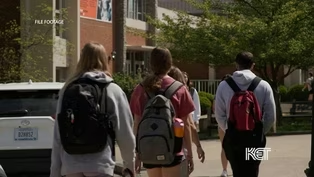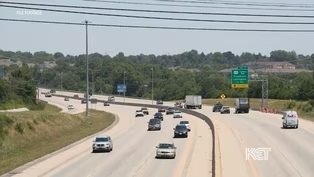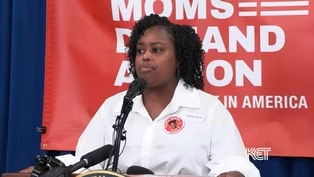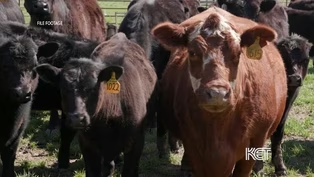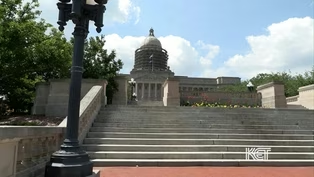
DEI Poll
Clip: Season 2 Episode 185 | 3m 21sVideo has Closed Captions
A new poll on where Kentuckians land on the issue of government-backed DEI programs.
A new poll on where Kentuckians land on the issue of government-backed DEI programs. We spoke to the non-profit behind the poll, the Foundation for a Healthy Kentucky, about the results and what DEI legislation currently being considered by General Assembly could mean for the state.
Problems playing video? | Closed Captioning Feedback
Problems playing video? | Closed Captioning Feedback
Kentucky Edition is a local public television program presented by KET

DEI Poll
Clip: Season 2 Episode 185 | 3m 21sVideo has Closed Captions
A new poll on where Kentuckians land on the issue of government-backed DEI programs. We spoke to the non-profit behind the poll, the Foundation for a Healthy Kentucky, about the results and what DEI legislation currently being considered by General Assembly could mean for the state.
Problems playing video? | Closed Captioning Feedback
How to Watch Kentucky Edition
Kentucky Edition is available to stream on pbs.org and the free PBS App, available on iPhone, Apple TV, Android TV, Android smartphones, Amazon Fire TV, Amazon Fire Tablet, Roku, Samsung Smart TV, and Vizio.
Providing Support for PBS.org
Learn Moreabout PBS online sponsorshipWhere where do Kentuckians land on the issue of government backed diversity, equity and inclusion programs?
A new poll provides some insight into that.
Yesterday, we talked to NPR's Ryland Barton about this.
We also spoke to the nonprofit behind the poll The Foundation for a Healthier Kentucky, about the results and what do I legislation currently being considered by the Kentucky General Assembly could mean for the state?
The data shows that that when you have a sense of belonging in society, your health is better.
And that's what we try to promote is better health.
And that's why we decided that it was important to see how the public generally felt about this issue.
The poll showed us that Kentuckians don't want essentially don't want to be ordered what to do in this regard, which means that if somebody or an entity, whether it be a business or a public institution like a university, wants to engage in these programs, they ought to be allowed to do it.
We did find it a little bit surprising, and we expected, for instance, more conservatives and Republicans in general to be less interested in promoting the programs.
And we found that I guess it's not necessarily that they're in favor of the programs, but they're in favor of people having the opportunity to make that choice themselves and entities having the opportunity to make that choice like institutions in the state and businesses in the state, to be able to institute the programs if they so chose.
Well, it tells us that we've just got to convince people that that these are important to the future health of our our citizenry, that the programs really assume that you've got groups that are not starting on a footing of equity.
And the hope is that you can bring them up to or help bring them up to an equitable situation.
And I think some of the things that the legislature is proposing, in fact, assume that everybody's starting at the same place and they're just not.
History tells us that the programs are put in place to try to address situations where groups are marginalized already.
They are historically marginal lives.
And if you remove the programs, it follows that that marginalization will either continue or widen.
So these programs, you know, if you want to avoid marginalization and if you want to improve the health of some of these groups who are suffering poor health, you would want to keep these the programs in place.
Now, the results of the poll were seeing around some Senate action on Senate Bill six, which they passed, which places restrictions on D-I initiatives, programs, orientations at public universities and colleges.
The bill is now in the possession of the House and is waiting for a committee hearing.
Video has Closed Captions
Clip: S2 Ep185 | 2m 12s | A Senate committee reaffirms the need to enroll and graduate more disadvantaged students. (2m 12s)
Video has Closed Captions
Clip: S2 Ep185 | 3m 23s | House Bill 7 would create a framework for fully autonomous vehicles to use Kentucky roads. (3m 23s)
Video has Closed Captions
Clip: S2 Ep185 | 3m 27s | Moms Demand Action were back at the Capitol, pushing for new gun legislation. (3m 27s)
Video has Closed Captions
Clip: S2 Ep185 | 1m 37s | The Kentucky House greenlights Murray State University to open a veterinary school. (1m 37s)
Video has Closed Captions
Clip: S2 Ep185 | 3m 45s | A plan to change how sick leave balances are used in the state teacher pension system. (3m 45s)
Video has Closed Captions
Clip: S2 Ep185 | 1m 54s | More teenagers could be tried as adults under a bill that cleared the full Senate. (1m 54s)
Providing Support for PBS.org
Learn Moreabout PBS online sponsorship
- News and Public Affairs

Top journalists deliver compelling original analysis of the hour's headlines.

- News and Public Affairs

FRONTLINE is investigative journalism that questions, explains and changes our world.












Support for PBS provided by:
Kentucky Edition is a local public television program presented by KET
